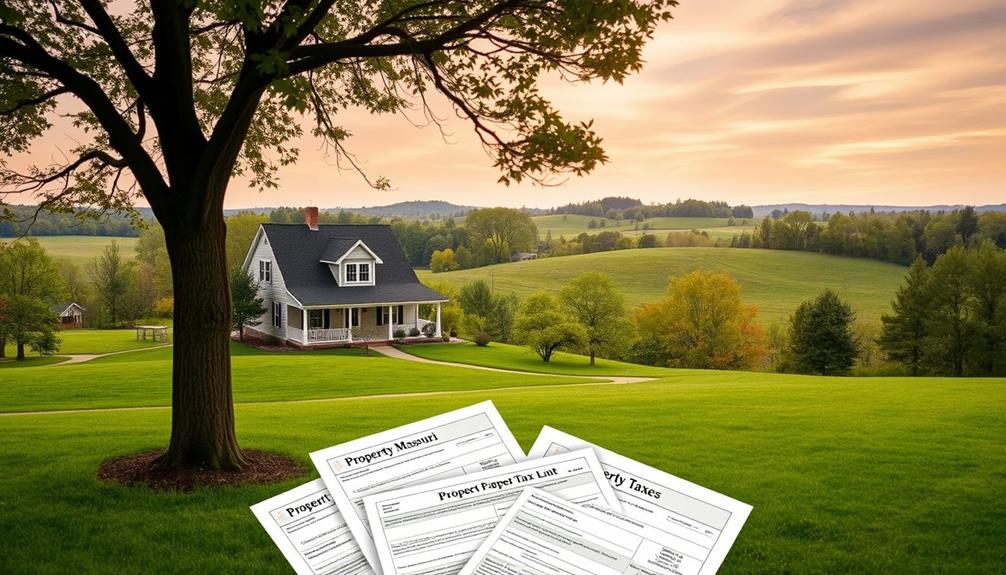When withdrawing funds from your IRA in Missouri, keep in mind that these amounts will be taxed as regular income. Missouri’s progressive tax rates range from 2.00% to 4.95%. You will not be taxed on the first $1,207 of your income, but any amount exceeding that will be subject to these rates. Unlike certain pension withdrawals, IRA distributions do not qualify for special exemptions. It is advisable to seek guidance from the Missouri Department of Revenue regarding your individual tax situation. Understanding these regulations can assist you in better preparing for retirement, especially considering potential upcoming changes.
Key Takeaways
- IRA withdrawals in Missouri are taxed as regular income, subject to the state's progressive income tax rates ranging from 2.00% to 4.95%.
- The first $1,207 of income is exempt from Missouri state taxes, benefiting lower-income retirees.
- Withdrawals from IRAs do not qualify for the partial exemptions available to public pension income.
- Local taxes, such as an additional 1% in certain cities, may apply to IRA distributions.
- Consulting the Missouri Department of Revenue can provide personalized insights into tax implications of IRA withdrawals.
Overview of Missouri Tax Structure

Understanding Missouri's tax structure is essential for anyone considering IRA withdrawals. Missouri operates under a progressive income tax system, with income tax rates that range from 2.00% to 4.95%. When you file your Missouri state tax return, keep in mind that while the first $1,207 of income isn't taxed, earnings above that amount will be taxed progressively across various brackets, including your IRA withdrawals.
If you're a retiree, you should note that Social Security benefits are subject to specific exemptions based on income thresholds. However, your retirement income, like IRA withdrawals, remains fully taxable.
Additionally, if you're living in cities such as St. Louis or Kansas City, you'll encounter an extra local tax of 1%, which can affect your overall tax liability.
As you navigate your financial planning, remember that Missouri's effective property tax rate averages 1.01% of the assessed home value, slightly below the national average. This context can be helpful as you strategize for tax efficiency in retirement.
Understanding these elements will better prepare you for the tax implications of your withdrawals.
IRA Withdrawals and Taxation

When planning your retirement income in Missouri, it's important to grasp how IRA withdrawals are taxed. In the Show-Me State, these withdrawals are considered regular income and are subject to Missouri state taxes. The tax rates range from 2.00% to 4.95%, depending on your overall taxable income.
For the 2023 tax year, the first $1,207 of your income isn't taxed, but if your income exceeds $80,000, you'll face progressive tax rates across various brackets.
Keep in mind that while Missouri offers a partial exemption for private pension income, IRA distributions don't qualify for this exemption—they're fully taxable. This means all your IRA withdrawals will add to your taxable income, which can impact your overall tax liability.
As you prepare for retirement, take note that, starting in 2024, Social Security benefits for individuals aged 62 and older will no longer be taxed by the state, but this relief doesn't extend to IRA withdrawals.
For specific tax implications regarding your IRA withdrawals, it's a good idea to consult the Missouri Department of Revenue, as your tax situation can vary based on individual circumstances.
Tax Treatment of Social Security

Social Security benefits will see a significant change in Missouri starting in 2024, as they won't be subject to state taxes for individuals aged 62 and older.
This shift means you can keep more of your hard-earned money, reducing the burden of state income tax on your retirement. If your Modified Adjusted Gross Income (MAGI) is below $85,000 for single filers or $100,000 for joint filers, you'll enjoy a full exemption from Missouri taxes on your Social Security retirement benefits.
This is a huge win for retirees like you. Here are four reasons why this change is exciting:
- Increased disposable income: Enjoy the freedom to spend or save without the worry of retirement tax on your Social Security.
- Improved financial security: Keep more money in your pocket, allowing for better planning in your golden years.
- Attractiveness of Missouri as a retirement destination: This favorable tax treatment enhances your choice for settling down in Missouri.
- Simplified tax structure: Say goodbye to the complex thresholds that previously dictated taxable income.
Public Vs. Private Pension Taxes

When planning for retirement income, it's essential to understand the tax treatment differences between public and private pensions.
In Missouri, public pensions offer substantial exemptions, while private pensions are taxed as regular income.
This distinction can considerably impact your overall tax burden, so you'll want to strategize your withdrawals accordingly.
Tax Treatment Differences
In Missouri, understanding the tax treatment differences between public and private pensions is essential for retirees looking to optimize their financial strategy.
Public pensions offer a significant advantage, allowing you to potentially exempt up to $46,381 of your benefits from state taxes in 2024. On the other hand, private pensions are taxed as regular income, with a limited exemption of up to $6,000 based on income thresholds.
This disparity can have a substantial impact on your finances.
Consider these points:
- Maximize your public pension benefits to take full advantage of tax deductions.
- Plan for your private pension income and anticipate higher state taxes.
- Diversify your retirement accounts to minimize your tax liabilities.
- Stay informed on tax relief options, especially with Social Security benefits being exempt starting January 1, 2024.
Exemptions for Seniors
As a senior in Missouri, you can greatly benefit from understanding the exemptions available for your retirement income. Missouri offers specific tax relief for different types of income, particularly for public and private pensions.
Here's a quick comparison:
| Type of Income | Exemption Details | Income Limits |
|---|---|---|
| Social Security | Fully exempt if income < $85,000 (single) | $85,000 (single), $100,000 (joint) |
| Public Pensions | Maximum exemption of $46,381 per taxpayer | N/A |
| Private Pensions | Up to $6,000 exemption for MAGI ≤ $25,000 | $25,000 (individual), $32,000 (joint) |
| IRAs/401(k)s | Taxed as regular income, no specific exemptions | N/A |
| Total Retirement Income | Varies by type; plan for income diversification | N/A |
Understanding these exemptions for seniors can help you maximize your retirement income. Be mindful that while public pensions receive substantial deductions, private pensions and retirement accounts are taxed differently. Watch your Modified Adjusted Gross Income to ascertain you qualify for exemptions, making your retirement more financially secure.
Planning for Retirement Income
Maneuvering the complexities of retirement income can be challenging, especially when considering the tax implications of public versus private pensions. Effective tax planning is essential to maximize your retirement income. Here's what you need to know:
- Public pensions: In Missouri, you might qualify for a substantial deduction on your public pension income, potentially exempting up to $46,381 in 2024.
- Private pensions: These are partially taxable, but if your modified adjusted gross income (MAGI) is $25,000 or less for single filers or $32,000 for joint filers, you may receive exemptions.
- Social Security benefits: Starting in 2024, if you're aged 62 or older, these benefits will be fully exempt from state income tax, providing you with significant relief.
- IRA withdrawals: Remember, withdrawals from traditional IRAs and 401(k) plans are taxed as regular income, subjecting you to state income tax rates from 2.00% to 4.95%.
Understanding these differences can help you create a solid strategy for your retirement income, allowing you to enjoy your golden years without financial stress.
Income Tax Brackets in Missouri

Understanding Missouri's income tax brackets can greatly influence your financial planning. Missouri employs a progressive income tax system, with rates ranging from 2.00% to 4.95% across different tax brackets. For retirees, knowing these rates can help you manage withdrawals from retirement plans and pension income effectively.
Here's a quick overview of the income tax brackets:
| Income Range | Tax Rate |
|---|---|
| $0 – $1,207 | 0% |
| $1,208 – $2,394 | 2% |
| $2,395 – $3,579 | 3% |
| $3,580 and above | 4.00% – 4.95% depending on income |
Keep in mind that the first $1,207 of income isn't taxed, which can benefit you if your income is lower. Additionally, local income taxes of 1% in St. Louis and Kansas City can further affect your overall state income taxes. Don't forget to take into account the standard deductions of $12,350 for single filers and $24,700 for married couples, as they can considerably reduce your taxable income. Tax credits for low-income earners and seniors provide further relief within these brackets.
Sales Tax Considerations

When you withdraw funds from your IRA, remember that while Missouri doesn't tax those withdrawals, any purchases you make with that money may be subject to sales tax.
The state's base sales tax rate is 4.23%, but local jurisdictions can add additional taxes, bringing the average to about 8.38%.
Be sure to check for exemptions on certain items like food and prescription drugs, as these won't incur sales tax.
State Sales Tax Rate
Maneuvering Missouri's sales tax landscape can be complex due to the combination of the statewide rate and various local taxes. Missouri's state sales tax rate stands at 4.225%, but local jurisdictions can impose additional sales taxes, resulting in an average combined state and local rate of approximately 8.38%. This variability means you might pay much more in sales tax depending on where you make your purchases.
Here are some key points to keep in mind:
- Local rates can increase costs notably. Some areas impose local sales tax rates as high as 7.76%.
- Online purchases are taxed too. The Supreme Court ruling allows Missouri to collect sales tax from remote sellers.
- Sales tax funds essential services. This system supports education and public safety, impacting your community directly.
- Most goods and some services are taxed. However, be aware of exemptions for items like prescription drugs and certain food products.
Navigating Missouri's sales tax system requires awareness of these factors, so you can make informed purchasing decisions while minimizing your overall tax burden.
Exemptions for Certain Goods
Maneuvering exemptions for certain goods in Missouri can notably impact your overall sales tax burden. In the state, the sales tax rate is 4.225%, but when combined with local rates, it can climb to an average of 8.38%.
Thankfully, several exemptions can help ease this burden. Most food items, prescription drugs, and utilities are exempt from sales tax, allowing you to save money on essential purchases.
Moreover, services in Missouri aren't subject to sales tax, which is particularly beneficial if you're relying on services rather than tangible goods in your retirement. This means that when you're budgeting after your IRA withdrawals, you can account for lower costs in these areas.
However, keep in mind that local jurisdictions may impose their own sales taxes, leading to varying rates across counties and cities. It's important to stay informed about the specific regulations in your area, as exemptions and rates can differ greatly.
Property Tax Overview

Property taxes play a crucial role in funding essential local services, from schools to public safety. In Missouri, understanding how these taxes work can help you manage your finances better. Here's what you should know:
- Average Property Tax Bill: The typical property tax bill in Missouri is $1,676, notably lower than the national median of $2,869.
- Effective Rate: Missouri boasts an average effective property tax rate of 1.01%, slightly below the national average of 1.1%.
- Homestead Exemption: If you're a qualifying senior or disabled individual, you may benefit from a homestead exemption, which provides additional property tax relief.
- Assessment Cycle: Property tax assessments occur every two years in most counties, ensuring that your property values are current for tax purposes.
It's important to stay informed about how property taxes affect your Missouri property. Knowing your property tax bill and the available exemptions can alleviate some financial stress, allowing you to plan better for your future.
Tax Credits for Seniors

As a senior in Missouri, you can take advantage of several tax credits that may ease your financial burden.
If your income falls below certain thresholds, you could fully exempt your Social Security benefits from state taxes and qualify for property tax credits.
Understanding these benefits can help you maximize your retirement income and keep more money in your pocket.
Senior Tax Credit Benefits
Many seniors may not be aware of the various tax credits available that can greatly ease their financial burden during retirement. Understanding these senior tax credit benefits can make a significant difference in your financial situation.
Here are some key credits to take into account:
- Property Tax Credit: Eligible homeowners could receive up to $1,100, while renters may qualify for up to $750, reducing your overall tax load.
- Modified Adjusted Gross Income (MAGI) Deductions: If your MAGI is $25,000 or less as a single filer, or $32,000 or less as joint filers, you can get substantial deductions on your retirement income, including private pensions.
- Exemption on Social Security Benefits: Starting in 2024, Social Security benefits will no longer be subject to state taxes for individuals aged 62 and older, providing crucial tax relief.
- Public Pension Exemption: For those with public pensions, up to $46,381 can be exempt from state taxes, further enhancing your financial well-being.
Income Threshold Exemptions
Income threshold exemptions play an essential role in easing the tax burden for seniors, especially when it comes to retirement income.
In Missouri, if you're 62 or older, you can be exempt from state taxes on your Social Security benefits if your income is below $85,000 for single filers or $100,000 for joint filers starting in 2024. This provides significant relief for many seniors maneuvering their fixed incomes.
Additionally, public pension income qualifies for substantial deductions, allowing you to exempt up to the maximum Social Security benefit amount, which is $46,381 in 2024.
If your Modified Adjusted Gross Income (MAGI) is $25,000 or less, you can also enjoy a partial exemption on other retirement income, including private pensions.
For joint filers, having a MAGI of $32,000 or less doubles these exemptions, giving couples an even greater tax advantage.
Future Tax Changes in Missouri

Anticipating significant changes in Missouri's tax landscape, retirees can look forward to favorable adjustments that may ease their financial burdens. Starting January 1, 2024, Social Security benefits will be fully exempt from Missouri state taxes for individuals aged 62 and older. This means more money in your pocket as you enjoy your golden years.
Here are some key points about the future tax changes that could benefit you:
- Full exemption of Social Security benefits—no more worrying about how much retirees pay in taxes.
- Phasing out taxation—income limits on Social Security benefits will be eliminated, enhancing Missouri's appeal for retirement.
- Public pension income deductions—you can take advantage of exemptions up to $46,381 in 2024.
- Potential property tax exemptions—discussions are underway to increase these for seniors, making homeownership more affordable.
Additionally, proposed adjustments to income tax rates for lower brackets may further reduce your overall tax liabilities as a retiree.
These future tax changes signal a more favorable environment for retirees in Missouri, enabling you to enjoy your retirement with less financial stress.
Resources for Tax Planning

Guiding through the tax implications of IRA withdrawals can be challenging, but you have a wealth of resources at your fingertips to ease the process. The Missouri Department of Revenue is a key resource, offering extensive tax guides that detail state tax rates and exemptions specifically for IRA withdrawals.
You can also utilize their State Income Tax Calculator to estimate potential tax withholding on your retirement income.
Consulting a tax advisor is highly recommended for personalized insights into your unique situation, as Missouri's tax laws can be complex. They can help you navigate the nuances of state tax and advise on the implications of withdrawing from your IRA.
Additionally, if you're aged 62 or older, you might benefit from the recent changes that fully exempt Social Security benefits from state tax, which can greatly impact your overall retirement income planning.
Organizations like AARP also provide valuable tax preparation assistance, helping retirees like you understand and manage the intricacies of state taxes on retirement income, including IRAs.
Frequently Asked Questions
Do You Pay State Income Tax on IRA Withdrawals?
Yes, you pay state income tax on IRA withdrawals. In your case, the withdrawn amount counts as regular income, and you'll be taxed based on your applicable income tax rate in your bracket.
Do You Pay Missouri State Tax on Social Security?
You might worry about taxes eating into your retirement income, but starting in 2024, you won't pay Missouri state tax on Social Security benefits if you're 62 or older. That's real financial relief!
What Are the Tax Changes for Missouri in 2024?
In 2024, you'll see Missouri fully exempt Social Security benefits from state taxes for those 62 and older. Additionally, public pension deductions remain substantial, enhancing the state's attractiveness for retirees seeking tax relief.
What Pensions Are Not Taxable in Missouri?
In Missouri, military pensions aren't taxable. Additionally, Social Security benefits are fully exempt for those 62 and older, provided your income meets certain thresholds. Public pensions also enjoy significant deductions, easing your tax burden.
Conclusion
In conclusion, understanding the tax implications of your IRA withdrawals in Missouri is vital for effective financial planning. Did you know that nearly 30% of retirees in Missouri rely on Social Security as their primary income source? This highlights the importance of considering how different income streams are taxed. By staying informed about state tax structures and potential changes, you can make better decisions that enhance your retirement security. Don't hesitate to consult a tax professional for personalized advice!









